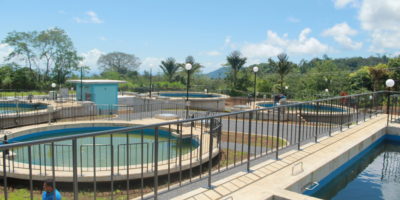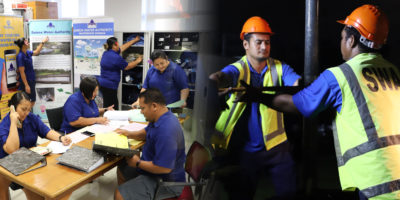Why is it important to treat wastewater?
The treatment of wastewater is important to remove toxins and harmful organic pollutants before its release to the local environment. Treatment works to limit exposure to water-borne diseases and water pollution. Treated wastewater should comply with all national regulations and standards before its release. For SWA the treated Wastewater has to comply with the SPREP (1996) discharge guideline.
What is a pre-treatment
It’s the process and equipment required to treat wastewater before it’s discharged into the wastewater system.
Most commercial trade wastewater customers must install and maintain grease traps and other pre-treatment equipment. Your permit will explain your conditions and you must obtain SWA approval to use any pre-treatments.
These may include installing and maintaining specific equipment for your business activities. If you’re unsure whether you need to pre-treat the wastewater from your building, please contact SWA to discuss.
Adding solvents, enzymes, mutant or natural bacteria, odour controlling agents and pesticides to grease traps or pre-treatment systems in not permitted.
Some substances cannot be discharged at all, and some pre-treatment equipment must not be connected to our system.
Who manages the pressure sewer system?
The Wastewater Division under Samoa Water Authority manages the Pressure Sewer System. This system comprises of a wastewater storage tank, a submersible pump with sensor, control panel and a boundary kit.
Who is responsible for my building’s plumbing?
The customer is responsible for all building plumbing works. Customers must find a reputable plumber to install all inlet fixtures towards the Pressure Sewer System. The Wastewater Division is responsible for connections that start from the sewerage tank towards the main sewer line.
What can I use the sewerage system for?
The Apia Pressure Sewerage System tolerates normal domestic wastewater, similar to a typical septic tank system. Wastewater from toilets, laundries and kitchens are all acceptable. Some items can cause excessive wear to the pump, and in some rare cases can lead to blockages, so it’s important to be aware of what must not be discharged.
What substances cannot be discharged?
Here is an example list of things that must NOT be discharged into the system:
- Rainwater, roof water, storm water
- Sanitary napkins, tampons
- Glass
- Kitty litter, coffee grinds
- Metal
- Explosive substances
- Plastic objects
- Seafood shells, fish scales
- Flammable liquids
- Aquarium gravel
- Lubricating oil and greases
- Nappies, socks, rags, clothes
- Petrol, diesel or kerosene
- Strong chemicals
If wastewater from your building includes any of the above contaminants, either now or in the future, you must arrange for pre-treatment (such as grease traps) to remove these items before the wastewater enters the pressure sewage system.
If these types of materials are discovered in the pump well, the customer may be liable for the cost of any repairs required.






